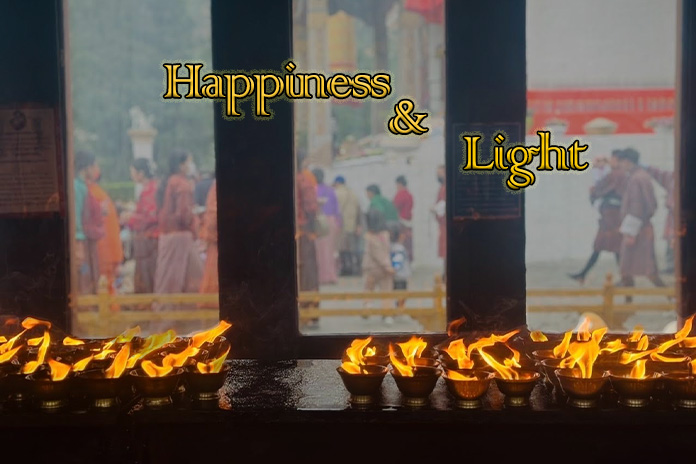
WHEN you’re sandwiched by populous economic and political giants, India and China, you have to find another way to make your mark.
While money and might power the giants of Asia, little Bhutan, with a population about 0.0005% that of the big boys, opts for happiness.
Bhutan’s Gross National Happiness (GNH) philosophy approach prioritises the well-being of citizens and the environment above economic growth. That’s one way to keep the population somewhat appeased that they may not feel disgruntled about what they don’t have.
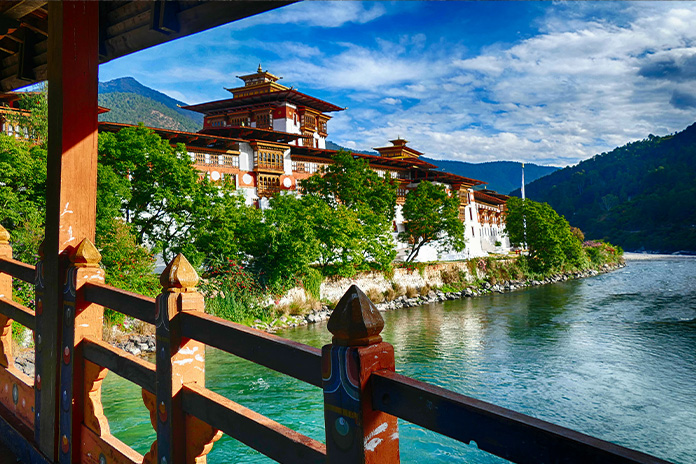
Oh, To Sniff Some Happiness
As I stepped off the plane in Paro, Bhutan, I was curious to understand what happiness felt like, especially the sort of happiness that makes for global headlines. What does a visitor to Bhutan see or feel that will make them happier – physically, emotionally, spiritually. Or is it just hype?
Looking around this tiny Himalayan kingdom, its natural beauty and unique culture must be strong ingredients for this sense of happiness.
In Punakha Valley, I crossed a 180-metre long suspension bridge with spectacular views of the Pho Chhu river and valley. The bridge is adorned with vibrant prayer flags, and walking across it is an adventure in itself! I felt the adrenaline rush, but also absorbed all the positive vibes from the colourful fluttering flags and enjoyed the lovely cool breeze. The surrounding mountains only added to the breath-taking view of the suspension bridge.
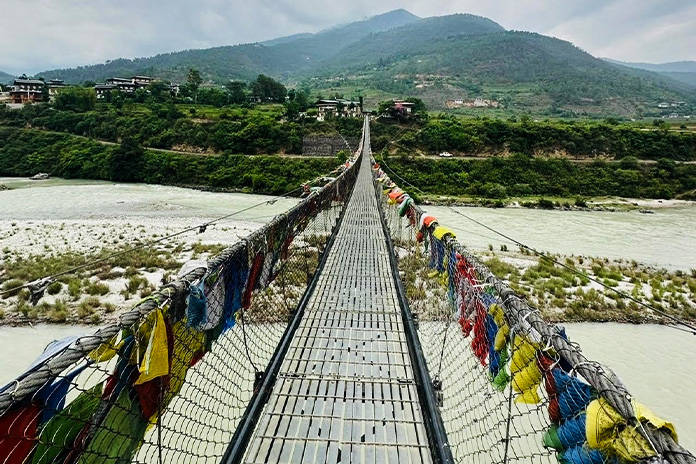
Gross National Happiness
The concept of Gross National Happiness is at the heart of Bhutan’s identity. Unlike conventional measures like Gross Domestic Product (GDP), which focus solely on economic factors, Bhutan’s GNH encompasses nine domains: psychological well-being; health; education; time use; cultural diversity and resilience; good governance; community vitality, ecological diversity and resilience, and living standards. Bhutan is the only country in the world that measures its success by this standard.
Most of Bhutan’s revenue is from tourism, which the revered King Druk Gyalpo invests in public education and health care.
ALSO READ: Designing A Safer Future
Carbon Negative Country
While Bhutan may arguably be the world’s happiest country, it is certainly one of the greenest. That’s no coincidence. The King developed his signature GNH index based on four pillars: sustainable development, environmental protection, cultural preservation, and good governance. Other countries have taken note since the Himalayan kingdom is not only carbon neutral but carbon negative.
The law mandates that 60 percent of its landmass be maintained and protected as forest. One of the ways the country maintains this is controlled, low impact tourism.
Bhutanese people smiled freely, greeted each other and us with kindness, and they seemed genuinely happy. But what struck me most was the government’s intentional focus on happiness. From sustainable tourism to organic farming, every aspect of Bhutanese life is designed to promote well-being.
I saw it in the pristine landscapes, the vibrant culture, and the warm hearts of the people. On one of our hikes, we met three generations of women. They were generous and kind, they even offered us free cucumber and chillies from their baskets.
The 80+ year old grandmother decided to hike with us uphill, except she danced in her flip-flops as she skipped up the slope with ease and grace, arriving at the top first!
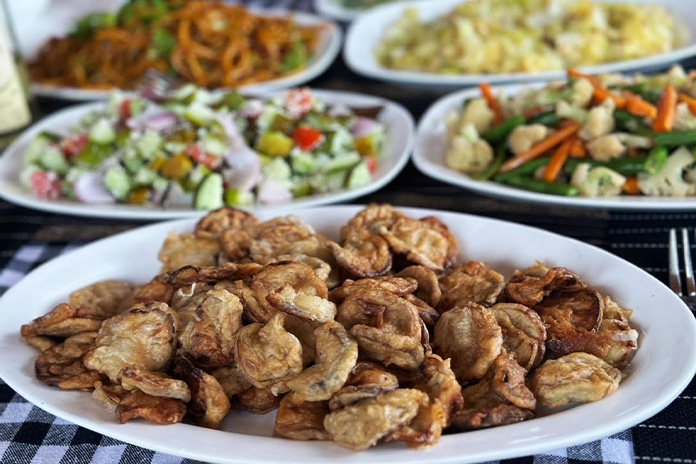
Buddhism, Food and Animals
Bhutan was one of the first countries in the world to go completely organic by banning the use of pesticides by its farmers. The country declared that it will only rely on animal and farm waste to fertilise crops.
One of the cornerstones of Buddhism is that it’s wrong to kill animals, but like every other country, there are meat lovers in the country. Their workaround is to import meat.
The main ingredients in Bhutanese food would involve dried beef, cheese, chillies, and potatoes.
Traditional Bhutanese food is lavishly spiced with dried or fresh red or green chillies. Which is exactly why, while in Bhutan you ought to try the national dish of Ema Datshi (Chilli Cheese).
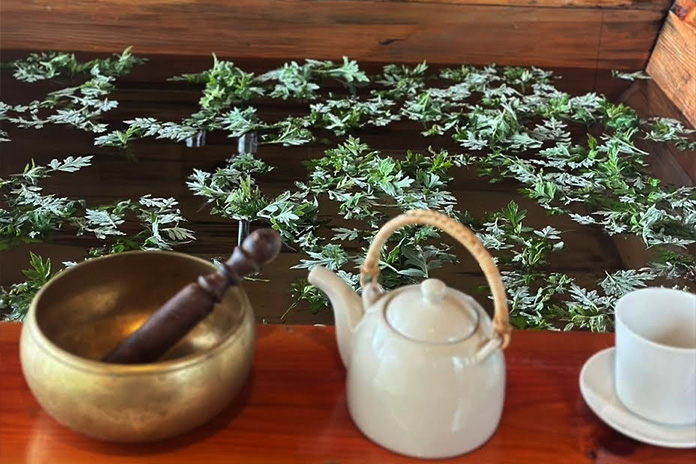
Myths And Meds
The Bhutanese people take pride in their unique traditions, which are deeply embedded in daily life. In the land of the Thunder Dragon, the emphasis on cultural values, compassion, kindness and respect for all living beings, contributes significantly to the overall sense of contentment and happiness in the country.
The Bhutanese practice of traditional medicine dates back to the eighth century and still forms a significant part of basic health care, blending culture and healing tradition, in which Buddhism is the prevailing influence.
As a fan of hot baths, I was eager to experience a traditional Bhutanese hot stone bath, which combines rustic charm with natural healing. This ancient practice relaxes and rejuvenates the body and mind, offering numerous health benefits. The Bhutanese have an ancient winter ritual of soaking in menchu (medicinal water), which is believed to have healing properties. The process is unique, using fresh river water mixed with Artemisia leaves.
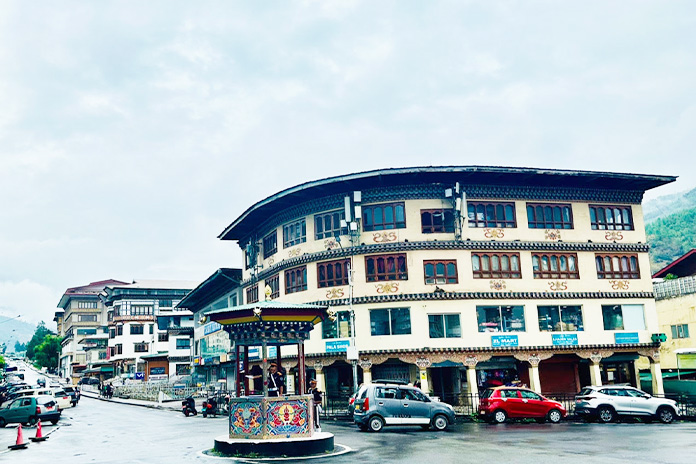
The Pursuit Of Happiness
In order to address the challenges of finding a workable balance between the various elements of its happiness aim, Bhutan’s government and stakeholders must invest in infrastructure development, improve accessibility, implement sustainable environmental practices and encourage private sector involvement. By acknowledging and addressing some of these challenges, Bhutan can maintain its unique approach to tourism while ensuring sustainable growth.
Bhutan’s tourism industry must strike a balance between preservation and growth.
By addressing challenges and implementing sustainable solutions, Bhutan can protect its environment and culture while benefiting from tourism.
ALSO READ: The Amplification Of Social Media
Takin To The Hills
During my journey, I hiked through lush forests, marvelled at ancient temples, and interacted with warm-hearted locals. Everywhere I went, I sensed a deep-seated contentment and joy.
At the iconic Punakha Dzong, a majestic fortress that embodies Bhutan’s rich history and spirituality, I headed to a local bar, where vibrant, live music filled the air, along with the raised voices of the locals singing along.
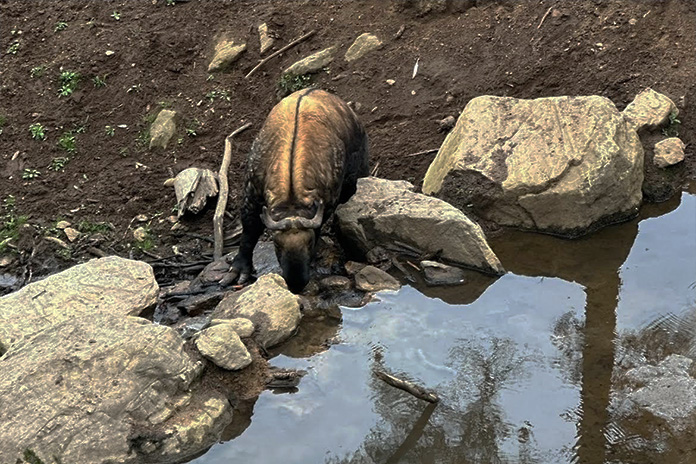
At the Mothithang Takin Preserve in Thimphu, Bhutan’s extraordinary national animal, the takin, is said to have been created by Tibetan saint Drukpa Kunley in the 15th century, by merging a goat’s head with a cow’s body!
Found in the Himalayas at 4,000m, the Takin roams free, feeding on bamboo and can weigh up to 400kg. With its majestic presence and unique features, the Takin has become a beloved symbol of Bhutan’s rich history and mythology. It was named Bhutan’s national animal in 2005.
The Meaning Of Happiness
Curious to find out what more about the happiness factor, I asked our guide, Ugay Denlop, what happiness mean to him. He responded with a cheeky grin, “I’m living in harmony with nature, being surrounded by lush forests, I get to climb these majestic mountains almost daily and I breathe clean air in a peaceful and beautiful country. Wouldn’t anyone be happy? As a Bhutanese, happiness to us means contentment, control of our mind, control of wants in our life. We live by our religion which is Buddhism — not to be jealous of others, be happy with what we have, be compassionate, be kind and be a society where we can be more than happy to share.”
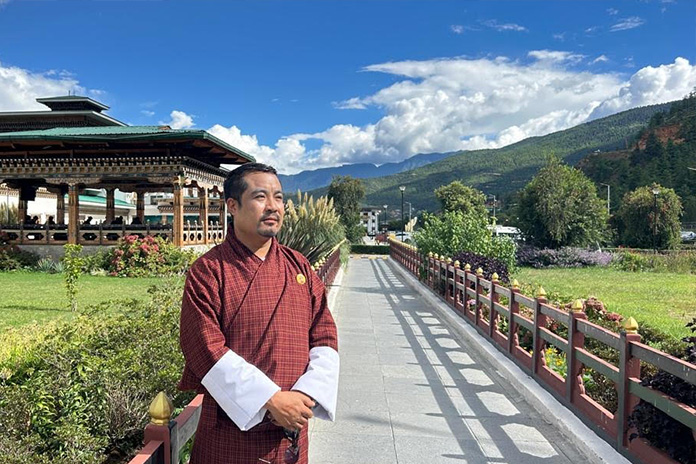
To Nima Thuktin, an avid cyclist and tour guide, happiness rests with education and healthcare, which the King provides. “Bhutanese treasure the tranquility of the mind. Simplicity, compassion and comfort defines the Bhutanese way of life. Our mind and our health is linked to our happiness.”
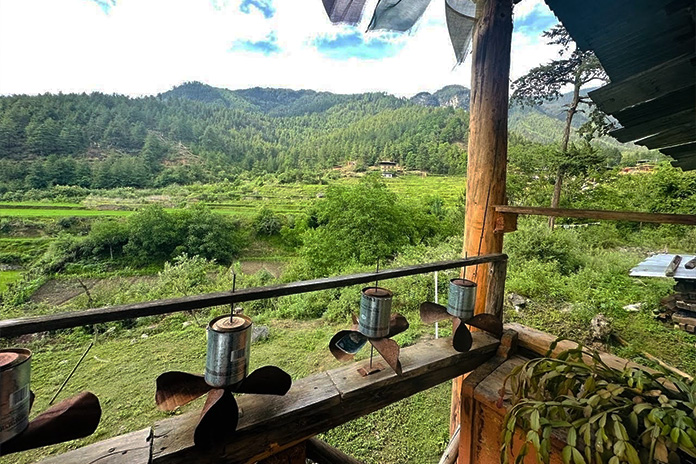
I had lunch at a local farm house in Paro and I met the owner, Ngawang Choki, owner of the Chencho Farm House in Paro. Ngawang is originally from a village of Lhuntse, East of Bhutan. “The king makes me happy. He is a People’s King. I work hard, and I don’t think of the future happiness.” She added that her motto in life is: “to work hard as a slave and enjoy as a king”.
ALSO READ: A Happy Space For A Healthy Brain
Bhutan is a fascinating place in many regards. The land of the Thunder Dragon has made an impression on me that no other place ever did. Bhutan’s mystical allure has a profound impact on the spirit, transporting me to a realm of serenity and, dare I say, spirituality.
Bhutan’s happiness index is more than just a metric – it’s a way of life. I felt grateful to have experienced it, albeit for a brief while.
Balancing Preservation and Growth
Bhutan has pioneered a unique tourism approach, prioritising environmental and cultural preservation through its “high value, low impact” policy. Despite this innovative strategy, the country faces various challenges as global changes accelerate.
Pros:
1. Cultural Preservation: Protecting Bhutan’s distinct culture and traditions.
2. Environmental Conservation: Prioritising sustainability and maintaining pristine environments.
3. Revenue Generation: Significant economic contribution from tourism.
4. Unique Experiences: Exploring breathtaking Himalayan landscapes and immersive cultural encounters.
5. Government Support: Initiatives promoting responsible tourism.
Cons:
1. Limited Infrastructure: Inadequate services and amenities in remote areas.
2. High Costs: Prohibitive minimum daily package fees for budget-conscious travellers.
3. Seasonal Fluctuations: Businesses struggle with off-season closures and peak-season overcrowding.
4. Environmental Concerns: Tourism poses risks to waste management, energy consumption, and water usage.
5. Accessibility Issues: Limited airport access and challenging road travel.





















